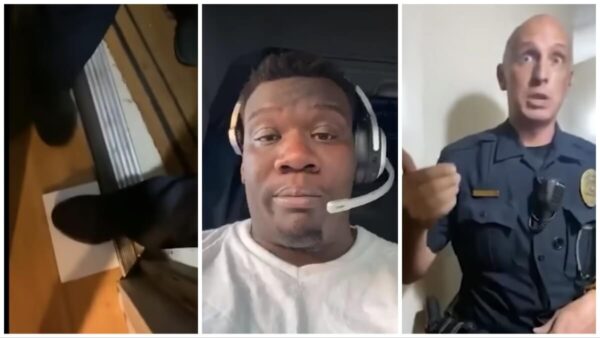A resurfaced cellphone video from 2020 showing police entering a man’s apartment without his permission raises questions over proper police conduct and a citizen’s constitutional rights.
YouTube channel Audit the Audit reposted a Facebook Live video posted by Christopher Finley showing his encounter with Arlington, Texas, police officers who came to his apartment after they received a call about a domestic disturbance on June 13, 2020.
Someone called police that day after they heard an argument between a man and woman and glass breaking in a neighboring apartment.
Although it’s unclear if Finley’s apartment was the source of the altercation, police came to his home to question him. Finley started recording a Facebook Live video when one of the officers blocked the apartment door with his foot after Finley moved to close the door and end the encounter.

The officers requested to enter, but Finley told them he felt threatened by their conduct and denied them entry without a warrant.
Police tried to question if there was a disturbance at Finley’s apartment, but Finley refused to answer their questions and continued to request the officers to leave after accusing them of trespassing since they continued to block his apartment door.
A police supervisor comes to Finley’s door to attempt to talk to Finley, asking Finley about his wife and child. Finley says he doesn’t have a wife and only he and his child live in his apartment. He insists that the officers leave and return with a warrant if they are invested in searching his home.
That supervisor stated that exigent circumstances allow them to enter Finley’s home without a warrant, which Finley challenges. Finley was also questioned about broken glass the officers saw on the floor, and Finley told them his son dropped his snack bowl.
Finally, the officers ask Finley if they can see his child, and Finley calls his young son over to the door. After Finley rejects the officers’ attempts to question his son and tries to talk to his son in front of them, the officers storm the apartment and begin yelling, “Stop hurting your child!” even though there’s no indication on the video of Finley harming his son.
Once they were inside, the police questioned Finley about what looked like blood on the floor. Finley said that it wasn’t blood and that he has a dog and then showed them a plastic bowl and snacks spilled onto the floor. After a brief search of the premises, the officers leave.
Audit the Audit spelled out if the officers would be found guilty of trespassing and violating Finley’s constitutional rights.
Texas penal code defines criminal trespassing as someone entering another person’s home without effective consent. However, the code defines “entry” as the intrusion of the entire body, rather than only a single body part crossing the threshold. So, a court might not find the officers guilty of trespassing.
Additionally, the superintendent told Finley that the officers didn’t need a warrant to enter his apartment because the domestic disturbance call gave them cause to enter and search his home.
Audit the Audit broke down case law that dictates that warrantless searches may be conducted if the needs of law enforcement are so compelling, that they are reasonable under the Fourth Amendment. That amendment sets a prohibition against unreasonable searches without warrants or reasonable causes.
The Supreme Court also held in two different cases that police may enter a home without a warrant if they believe an occupant is seriously injured or if someone is imminently threatened. Also, police have the authority to enter a dwelling if they have good reason to believe a threat exists, but it’s questionable whether it’s constitutional to enter a home to determine if a violent incident has just occurred.
Finley could likely argue in court that no exigent circumstances were present based on the absence of any indication of violence in his home or that a violent incident was about to take place.
It’s also likely a judge could conclude that, ultimately, the officers violated Finley’s Fourth Amendment rights by entering without a warrant or any indication of an immediate threat or an ongoing disturbance.
It’s unknown if Finley ever filed a complaint about the police encounter or if a police investigation was conducted into the responding officers’ conduct.
View the full video below:


